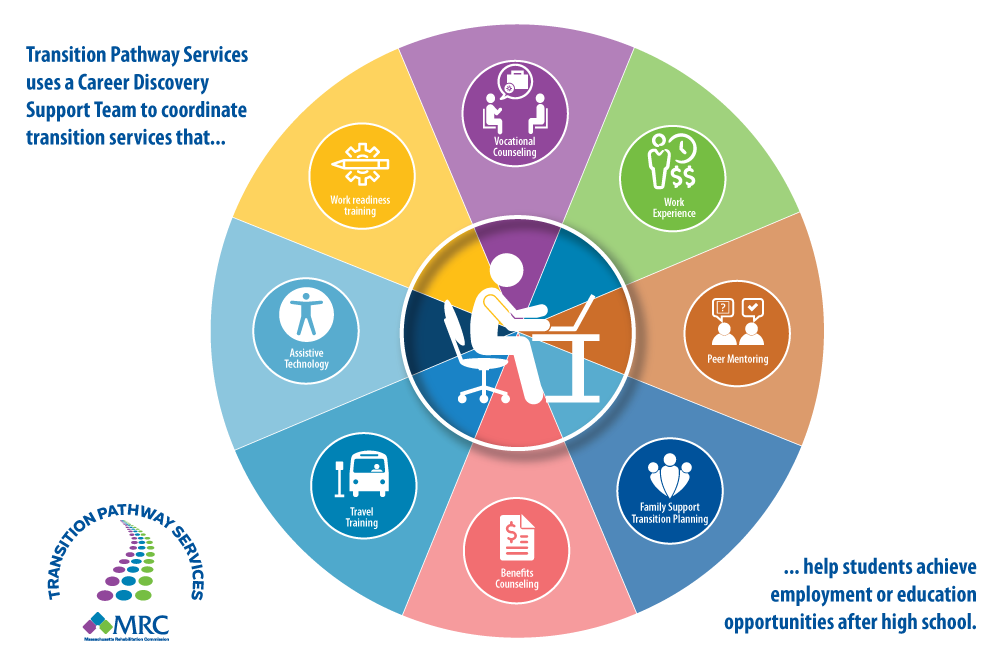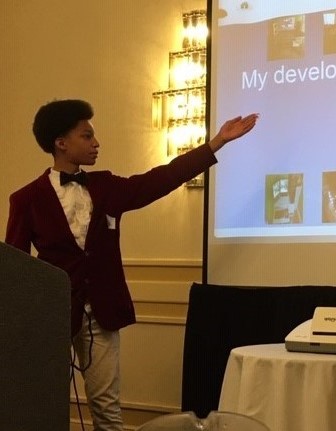Work-Based Learning at Pete’s Sweets
Watch this video to see how an internship at a local bakery prepared a student for his career path. Read more in the Student Highlights section below.
The Transition Pathway Services (TPS) Model Demonstration is 5-year federal grant that the Massachusetts Rehabilitation Commission (MRC) received from the Rehabilitation Services Administration, in the U.S. Department of Education. The TPS project aims to improve career and academic planning skills so that high school students with disabilities will be successful in achieving competitive integrated employment and post-secondary outcomes upon completion of their secondary education. MRC and partners provide work-based learning experiences and a menu of services to students. Through a person-centered collaborative team-based approach, students’ career goals are thoughtfully planned and supported.
MRC has dedicated TPS counselors in their Roxbury, Lawrence and Springfield offices serving the catchment areas in neighboring towns and cities. MRC is implementing and evaluating a coordinated set of services and supports (listed below) provided by community partners, including independent living centers, career centers, pre-employment transition services (Pre-ETS) vendors, and more than a dozen local education agencies (LEAs).
In July 2020, TPS Counselor Aisha Nakazibwe presented on the TPS Project as part of webinar about the five Transition Work-Based Learning Model Demonstrations in Maine, California, Maryland, Vermont, and Massachusetts funded by the Rehabilitation Services Administration.
Final Evaluation Report, January 2022 [PDF]
Download the TPS Newsletters for the latest news, highlights, and stories about students’ experiences with the project:
Participating students have access to the following 10 identified TPS services and supports:
- Vocational Counseling
- Career Assessment
- Work Readiness Training
- Assistive Technology
- Transportation Coordination
- Benefits Counseling
- Family Support Transition Planning
- Peer Mentoring
- Customized job placement
- Work Experience (at least one paid)

Key project activities focus on:
- Increasing access for students with disabilities to comprehensive transition related supports, with a focus on work experience.
- Developing career discovery teams (CDTs) that bring together community partners to coordinate the delivery of TPS services and supports at the local level.
- Measuring impact of the TPS Model Demonstration by conducting formative, process and outcome evaluations.
- Based on the evaluation results, refining the TPS model in preparation for expansion to other MRC area offices and potential replication by other states.
Project partners include:
- MRC Offices (click here to see map of catchment areas)
- Roxbury Office
(Catchment area includes: Hyde Park, Dorchester, Roxbury, Mattapan and the South End of Boston) - Lawrence Office
(Catchment area includes: Amesbury, Andover, Boxford, Bradford, Byfield, Georgetown, Groveland, Haverhill, Lawrence, Merrimac, Methuen, Newbury, Newburyport, North Andover, Rowley, Salisbury, and West Newbury.) - Springfield Office
(Catchment area includes: Agawam, Blandford, Chester, East Longmeadow, Feeding Hills, Granville, Hampden, Huntington, Longmeadow, Montgomery, Russell, Southwick, Springfield, Tolland, West Springfield, Westfield and Wilbraham)
- Roxbury Office
- Independent Living Centers (ILCs)
- Career Centers
- School Districts in the Roxbury / Lawrence / Springfield MRC catchments areas
- Transition Specialists from the Federation for Children with Special Needs
- Transportation Coordinator
Transition Pathway Services Recruitment Video
Students with disabilities age 16 who are two years from graduating high school and who live in the MRC office catchment areas are encouraged to contact MRC for more information. Students and their parents or guardians should contact Teri Koopman at the email or phone below.
As a TPS project partner, the Institute for Community Inclusion (ICI) provides research and evaluation support, as well as technical assistance.
For more information, contact:
Teri Koopman, Transportation and Community Partnership Coordinator
Massachusetts Rehabilitation Commission
Teri.Koopman@state.ma.us
Information about VR services for youth in transition: https://www.mass.gov/mrc-transition-services-for-students-and-youth
Student Highlights
 Cameron had a paid internship at Pete’s Sweets as part of the TPS project. Cameron’s work-based learning experience was an important stepping stone on his career pathway. After completing high school, Cameron has begun a culinary arts program at Holyoke Community College. Watch the video to find out how Cameron’s circle of support created opportunities for his growth.
Cameron had a paid internship at Pete’s Sweets as part of the TPS project. Cameron’s work-based learning experience was an important stepping stone on his career pathway. After completing high school, Cameron has begun a culinary arts program at Holyoke Community College. Watch the video to find out how Cameron’s circle of support created opportunities for his growth.
 With help from his TPS Counselor and Career Discovery Team, Kevin is following his passion for computers and technology. Kevin had an internship at a local computer company, Control Alt Delete. Impressed by his performance, the company has hired him to work on projects while he continues high school. In the long term, Kevin wants to pursue a career in software engineering. Kevin is pictured here giving a presentation at a TPS Collaborators Event in August.
With help from his TPS Counselor and Career Discovery Team, Kevin is following his passion for computers and technology. Kevin had an internship at a local computer company, Control Alt Delete. Impressed by his performance, the company has hired him to work on projects while he continues high school. In the long term, Kevin wants to pursue a career in software engineering. Kevin is pictured here giving a presentation at a TPS Collaborators Event in August.
 Work-based learning experiences can take many forms, including company tours, job shadowing, informational interviews, and on-site training. Isabel explored her interest in makeup through taking classes at a local Sephora and visiting a makeup academy, where she hopes to continue her training in makeup artistry. Read more about Isabel and her work-based learning experiences in the TPS Newsletter.
Work-based learning experiences can take many forms, including company tours, job shadowing, informational interviews, and on-site training. Isabel explored her interest in makeup through taking classes at a local Sephora and visiting a makeup academy, where she hopes to continue her training in makeup artistry. Read more about Isabel and her work-based learning experiences in the TPS Newsletter.
 After a successful first internship at State Street Bank, Roxbury TPS student TK was asked to return for a summer internship and to speak at a Careers and Networking event hosted by State Street. After graduating high school, TK enrolled at Roxbury Community College, where he plans to study mathematics. Read more about TK and his Career Discovery Team in the Spring 2019 Newsletter.
After a successful first internship at State Street Bank, Roxbury TPS student TK was asked to return for a summer internship and to speak at a Careers and Networking event hosted by State Street. After graduating high school, TK enrolled at Roxbury Community College, where he plans to study mathematics. Read more about TK and his Career Discovery Team in the Spring 2019 Newsletter.
Funder Information: The TPS Model Demonstration is funded by the Rehabilitation Services Administration (RSA), in the U.S. Department of Education, Grant Award: H421B16000.

